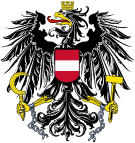| This article is part of a series on the |
| Politics of Austria |
|---|
 |
|
|
|
|
The Carinthian state and municipal elections of 2009 were held in the Austrian state of Carinthia on 1 March 2009. Carinthia is the stronghold of the national conservative Alliance for the Future of Austria, whose founder Jörg Haider died in a car accident on 11 October 2008. He was also the incumbent governor; after his death, he was replaced by Gerhard Dörfler as governor, by Uwe Scheuch as Carinthian BZÖ leader and by his close personal friend Stefan Petzner as national BZÖ leader. The election is likely to see a strong contest between the SPÖ and the BZÖ over the post of governor, while the other Austrian parties (the ÖVP, the FPÖ and the Greens) play only a minor role in Carinthian politics. [1]

Austria, officially the Republic of Austria, is a country in Central Europe comprising 9 federated states. Its capital, largest city and one of nine states is Vienna. Austria has an area of 83,879 km2 (32,386 sq mi), a population of nearly 9 million people and a nominal GDP of $477 billion. It is bordered by the Czech Republic and Germany to the north, Hungary and Slovakia to the east, Slovenia and Italy to the south, and Switzerland and Liechtenstein to the west. The terrain is highly mountainous, lying within the Alps; only 32% of the country is below 500 m (1,640 ft), and its highest point is 3,798 m (12,461 ft). The majority of the population speaks local Bavarian dialects as their native language, and German in its standard form is the country's official language. Other regional languages are Hungarian, Burgenland Croatian, and Slovene.

Austria is a federal republic made up of nine states, known in German as Länder. Since Land is also the German word for "country", the term Bundesländer is often used instead to avoid ambiguity. The Constitution of Austria uses both terms. Even though English "land" is a cognate, the term (Bundes)land is commonly rendered as "state" or "province" by tradition in English writing.

The Alliance for the Future of Austria is a right-wing populist and national conservative political party in Austria.
An OGM poll solicited by the BZÖ in late 2008 saw the BZÖ leading with 42%, the SPÖ with 29%, the ÖVP at 12%, the Greens at 10% and the FPÖ at 5%; a SORA poll for the Kleine Zeitung in December 2008 saw a much closer race, with the BZÖ at 41% (down from 44% in April), the SPÖ at 38% (up from 33% in April), the ÖVP at 11%, the Greens at 6% and the FPÖ at 2%. [2] A poll by Integral for Kurier in early January 2009 saw the BZÖ at 42%, the SPÖ at 34%, ÖVP at 12%, the Greens at 7% and the FPÖ at 5%. [3] A poll by the Humaninstitut for Die Presse saw 27% for the SPÖ, 25% for the BZÖ and a quarter of voters undecided. [4]

Kleine Zeitung is an Austrian newspaper based in Graz and Klagenfurt. As the largest regional newspaper in Austria, covering the federal states Styria and Carinthia with East Tyrol, the paper has around 800,000 readers.

Die Presse is a German language daily broadsheet newspaper based in Vienna, Austria.
Former deputy mayor of Klagenfurt Mario Canori was announced as the FPÖ's leading candidate on 22 December 2008, surprising many, as he had been a BZÖ member until that very day. [5] The Greens stated that their goal was to increase their share of the vote and gain a third seat. [6]

Klagenfurt am Wörthersee is the capital of the federal state of Carinthia in Austria. With a population of 100,772, it is the sixth-largest city in the country. The city is the bishop's seat of the Roman Catholic Diocese of Gurk-Klagenfurt and home to the University of Klagenfurt.
Following Dörfler's accusations against Canori, in which he claimed that Canori had received €200,000 for becoming the FPÖ leading candidate, Scheuch and Strutz distanced themselves from Dörfler, increasing speculation about a further split within the BZÖ. [7]
The following parties filed to stand in the election:
- Alliance for the Future of Austria, under the name "The Freedom-minded in Carinthia – Jörg Haider's List, BZÖ", despite the fact that the party's founder died in 2008 [8]
- Social Democratic Party of Austria
- Austrian People's Party
- The Greens – The Green Alternative
- Freedom Party of Austria
- Communist Party of Austria
- Only in Klagenfurt:
- List Strong
- Gaddafi Party (of the Egyptian-born Ahmed El Mesallamy, who wants to increase Carinthian business relations with the Arab world; Haider was known for his controversial encounters with Saddam Hussein and Muammar al-Gaddafi) [9]

Saddam Hussein Abd al-Majid al-Tikriti was President of Iraq from 16 July 1979 until 9 April 2003. A leading member of the revolutionary Arab Socialist Ba'ath Party, and later, the Baghdad-based Ba'ath Party and its regional organization the Iraqi Ba'ath Party—which espoused Ba'athism, a mix of Arab nationalism and socialism—Saddam played a key role in the 1968 coup that brought the party to power in Iraq.

The Social Democratic Party of Austria is a social-democratic political party in Austria and alongside with the People's Party one of the country's two traditional major parties.

The Austrian People's Party is a Christian-democratic and conservative political party in Austria. A successor to the Christian Social Party of the late 19th and early 20th centuries, it was founded immediately following the reestablishment of the Republic of Austria in 1945 and since then has been one of the two largest Austrian political parties with the Social Democratic Party of Austria (SPÖ). In federal governance, the ÖVP has spent most of the postwar era in a grand coalition with the SPÖ. Most recently, it has been junior partner in a coalition government with the SPÖ since 2007. However, the ÖVP won the 2017 election, having the greatest number of seats and formed a coalition with the national-conservative Freedom Party of Austria (FPÖ). Its chairman Sebastian Kurz is the youngest Chancellor in Austrian history.

The Greens – The Green Alternative is a political party in Austria.
The election saw the BZÖ win even more votes than under Haider, mostly due to nostalgic apotheosis of his personality; the SPÖ lost greatly, the ÖVP gained a bit, the Greens lost slightly and had to hope for the final result including absentee votes to see whether they had even made it into the Landtag, and the FPÖ failed to enter it. [10] With parts of the absentee vote counted, the Greens made it into the Landtag, keeping their two seats. [11]
| Party | Votes in % | Seats | |
|---|---|---|---|
| Alliance for the Future of Austria (BZÖ) | 44.9% | 17 | |
| Social Democratic Party of Austria (SPÖ) | 28.8% | 11 | |
| Austrian People's Party (ÖVP) | 16.8% | 6 | |
| The Greens – The Green Alternative (Grüne) | 5.1% | 2 | |
| Freedom Party of Austria (FPÖ) | 3.8% | 0 | |





